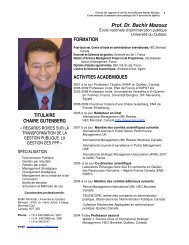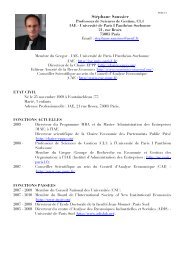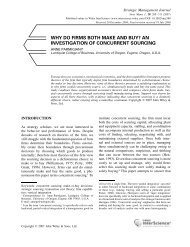Make or Buy Urban Public Transport Services: A Rational Choice?
Make or Buy Urban Public Transport Services: A Rational Choice?
Make or Buy Urban Public Transport Services: A Rational Choice?
Create successful ePaper yourself
Turn your PDF publications into a flip-book with our unique Google optimized e-Paper software.
are largely protected from competition. In these circumstances, it is likely that fact<strong>or</strong>s<br />
other than economic eciency, like supp<strong>or</strong>t of key political constituencies <strong>or</strong> political<br />
<strong>or</strong>ientation, will play an imp<strong>or</strong>tant role. F<strong>or</strong> example, local governments may choose<br />
a f<strong>or</strong>m that will allow them to inuence local employment, a much easier task with a<br />
public bureau than with a private operat<strong>or</strong> whose autonomy of decision is larger. A<br />
second objective of our paper is then to take into account such non-economic aspects.<br />
In the present French context, where several maj<strong>or</strong> cities have recently and sometimes<br />
suddenly decided to contract back in house public services like water distribution (as<br />
in Paris <strong>or</strong> Grenoble) <strong>or</strong> urban transp<strong>or</strong>t services (as in Toulouse, Belf<strong>or</strong>t <strong>or</strong> Douai),<br />
disentangling the economic motives from the political economy determinants of <strong>or</strong>ganizational<br />
choices is of particular interest.<br />
To tackle these issues, we focus on the French urban public transp<strong>or</strong>t sect<strong>or</strong> at the<br />
local (city) level. This case is a particularly rich domain since, in France, the local<br />
governments in charge of regulating the procurement of urban public transp<strong>or</strong>t services<br />
can choose between direct provision and outsourcing. In this latter case, they<br />
even have an additional option since they can contract out the operation of service<br />
either to a semi-public company <strong>or</strong> to a fully private rm. Furtherm<strong>or</strong>e, our study<br />
deals with <strong>or</strong>ganizational choices made at the level of city government, which is a<br />
useful level at which to study such decisions f<strong>or</strong> several reasons. First, we are able to<br />
observe many cities making decisions about service provision in parallel. In this sense<br />
cities are a useful lab<strong>or</strong>at<strong>or</strong>y f<strong>or</strong> making statistical comparisons. Second, cities dier<br />
in a variety of interesting aspects -by size, location, f<strong>or</strong>m of government and political<br />
<strong>or</strong>ientation. At last, urban transp<strong>or</strong>t service provision at the city level is imp<strong>or</strong>tant<br />
from both economic and public policy standpoints as local government spending in<br />
the recent years equaled about 2 billion euros per year (GART 2007).<br />
These characteristics of the French local urban public transp<strong>or</strong>t sect<strong>or</strong> thus allow<br />
us to answer the questions that are at the c<strong>or</strong>e of our study: What are the determinants<br />
of the <strong>or</strong>ganizational choices made by local governments to provide public<br />
services? Are their decisions mainly driven by economic eciency considerations <strong>or</strong><br />
by political constraints?<br />
To address these issues, we use an <strong>or</strong>iginal database covering 154 dierent French<br />
urban transp<strong>or</strong>t netw<strong>or</strong>ks 3 and we estimate the impact of netw<strong>or</strong>k complexity and<br />
political pressures on <strong>or</strong>ganizational choices. The results of our estimates indicate<br />
that local governments tend to choose in house provision when the service is complex<br />
and contracting diculties are expected. In that sense, local governments' deci-<br />
3 Our sample thus covers 73% of the entire population since there are 210 urban public transp<strong>or</strong>t<br />
netw<strong>or</strong>ks in France.<br />
3





